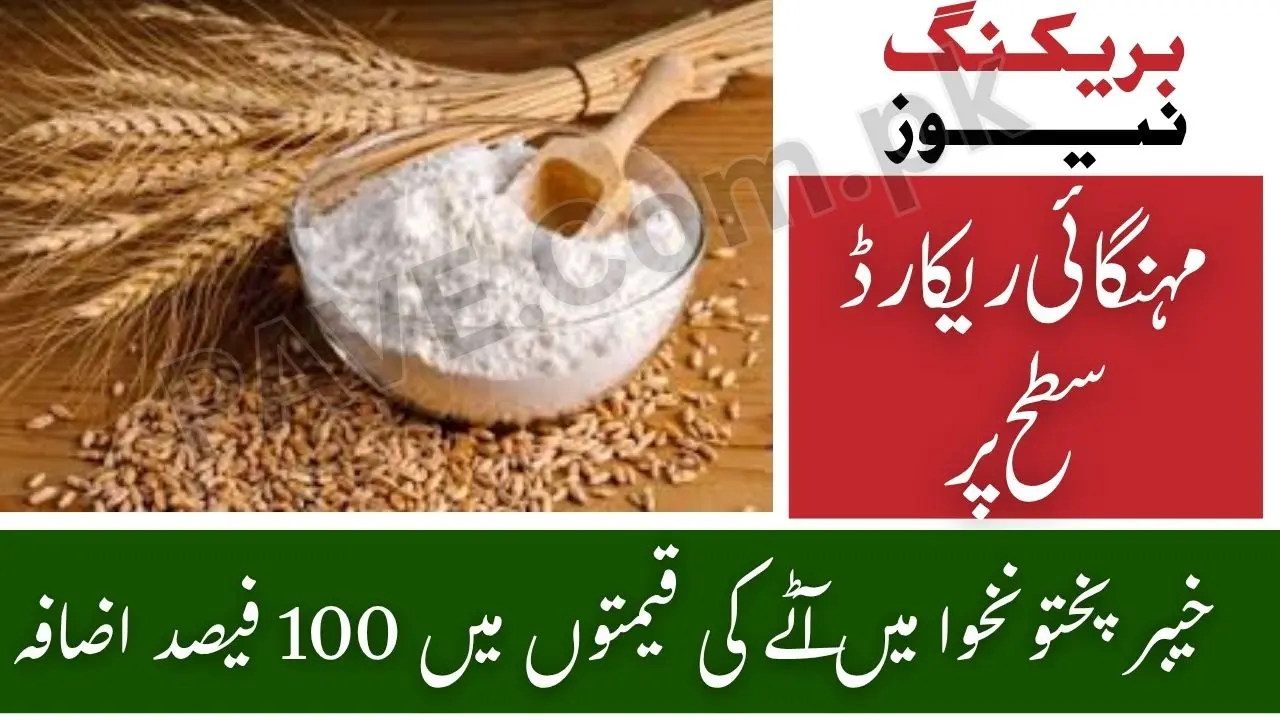Breaking News: Flour Prices in KP Double After Punjab Ban
Flour Prices in KP Double within two months, rising from Rs. 75 to Rs. 145 per kilogram after the Punjab government halted wheat and flour transport to the province. The move has triggered a full-blown market crisis, driving up roti prices and forcing many households to cut back on daily meals.
Market data from Peshawar, Mardan, and Swat shows the price of a 20-kg flour bag has jumped by over Rs. 1,200, reaching Rs. 2,900 in some districts. For low-income families, the cost of basic food has become unbearable.
“A single 150-gram roti now costs Rs. 30,” said a tandoor owner in Peshawar. “Earlier this year, it was Rs. 15 — our customers are angry, but we have no choice.”
Punjab’s Transport Ban Sparks Shortage
The crisis began after Punjab imposed a ban on the inter-provincial movement of wheat and flour, citing the need to secure local stock for its population. However, KP depends on Punjab for more than 80% of its wheat, making the restriction catastrophic for northern markets.
According to traders, the daily flow of wheat trucks into KP has fallen by nearly four-fifths, leaving mills unable to maintain normal production. Flour mill associations warn that unless the supply is restored, prices could exceed Rs. 160 per kilogram in the coming weeks.
KP Government Raises Alarm
In response to the escalating crisis, the Khyber Pakhtunkhwa government has formally written to the Punjab Food Department, demanding an immediate end to the wheat-transport ban. The letter, issued after a meeting chaired by Chief Minister Sohail Afridi, warned that Punjab’s decision was “deeply affecting the people of KP” and causing severe food insecurity.
Officials argue that Punjab’s restrictions violate the spirit of inter-provincial cooperation, especially when it comes to essential commodities like wheat and flour. The KP government has also requested federal intervention to ensure the uninterrupted supply of food staples across Pakistan.
Constitutional Argument – Article 155(1)
The KP administration has invoked Article 155(1) of the Constitution of Pakistan, which requires provinces to facilitate the free movement of goods and cooperate in matters of public welfare.
The letter to Punjab’s authorities states:
“Under Article 155(1), no province may obstruct the passage of essential commodities to another. Wheat and flour are staple foods; restricting their movement jeopardizes citizens’ right to food security.”
Legal experts say KP’s reference to constitutional provisions could compel the federal government to intervene, as food distribution and inter-provincial trade fall under national economic coordination.
Check Also: Breaking News: Punjab Govt Launches Maryam Nawaz Free Parwaz Card 2025
Comparative Price Analysis
| Province | Flour (20 kg Bag) Before Ban | After Ban (Oct 2025) | Change |
|---|---|---|---|
| Punjab | Rs. 1,650 – Rs. 1,750 | Rs. 1,850 – Rs. 1,900 | +10 % |
| Khyber Pakhtunkhwa | Rs. 1,650 – Rs. 1,700 | Rs. 2,900 – Rs. 3,000 | +90 % to 100 % |
Flour mills in KP report that wheat arrivals have dropped from 2,000 trucks per week to less than 400, forcing many mills to shut down temporarily or operate at reduced capacity.
Public Reaction and Social Pressure
Across KP, residents are expressing outrage at the skyrocketing food prices. In major cities, long queues have formed outside flour shops, while some bakeries and tandoors have started reducing the size of rotis to maintain affordability.
“We used to make 12 rotis per kilogram of flour; now, to survive, we make 10,” said a baker in Mardan. “Customers complain, but we can’t operate at a loss.”
Social media has exploded with criticism under hashtags such as #FlourCrisisKP, #WheatBan, and #RotiPrice30Rupees, urging the federal government to step in and resolve the issue.
Experts Warn of Broader Economic Impact
Economists warn that the crisis could spill over into other sectors. Higher flour costs are already pushing up prices of bakery items, confectionery, and packaged foods, further fueling inflation.
Dr. Farah Jameel, an economist at the University of Peshawar, explained:
“When food inflation rises this sharply, every other expense gets squeezed. Families divert money from education or healthcare just to buy flour. It’s an early sign of a humanitarian concern.”
She added that inter-provincial trade restrictions are “short-sighted” and could undermine Pakistan’s national food security framework.
Federal Government Expected to Intervene
Sources in the Ministry of National Food Security confirm that the federal government is closely monitoring the situation. Officials are reportedly considering a short-term quota of wheat releases from federal reserves to KP to stabilize prices and maintain mill operations.
If Punjab continues the restriction, Islamabad could issue a federal directive allowing limited transport under supervision — a move that might ease market pressure within weeks.
Impact on Daily Life
The flour shortage is already reshaping everyday life in KP:
- Tandoors have raised roti prices to Rs. 30 per piece, citing higher procurement costs.
- Restaurants in Peshawar and Swabi are revising menu prices every week.
- Families are switching from wheat flour to cheaper grains like maize or barley.
- Labourers are skipping meals or sharing smaller portions to manage expenses.
A schoolteacher from Swat told PAVE News:
“My monthly salary hasn’t changed, but the cost of essentials has doubled. Feeding a family of five has become a daily struggle.”
Political Debate and Accountability
Opposition leaders in KP have criticized both provincial and federal authorities for failing to anticipate the crisis. They argue that better coordination with Punjab could have prevented the surge.
Meanwhile, Punjab officials maintain that their temporary restrictions are meant to stabilize internal supply and prevent smuggling, denying any intent to harm KP consumers. However, the lack of transparent inter-provincial trade policy continues to fuel tensions.
Possible Way Forward
Policy experts propose several measures to ease the crisis:
- Federal Coordination Mechanism: Immediate meeting between Punjab and KP food departments under federal supervision.
- Wheat Quota Allocation: Temporary release of wheat from national reserves to KP until transport resumes.
- Inter-Provincial Trade Framework: Permanent legal framework ensuring free movement of essential goods.
- Market Monitoring: Anti-hoarding operations to control speculative price manipulation.
- Subsidized Roti Program: KP government could introduce limited subsidies for tandoors in urban centers.
If these steps are implemented, flour prices could normalize by late November 2025, preventing further food inflation during the winter season.
Check Also: Breaking News: Punjab Govt Launches Maryam Nawaz Free Parwaz Card 2025
Conclusion – Flour Prices in KP Double After Punjab Ban
The 100% surge in flour prices across KP underscores Pakistan’s fragile food-supply chain and the risks of unilateral provincial actions. With wheat transport suspended and prices soaring, ordinary citizens bear the brunt of policy disputes.
Unless swift action is taken to restore wheat flow from Punjab, KP’s flour crisis could escalate into a national food emergency, eroding public trust and deepening economic hardship.







